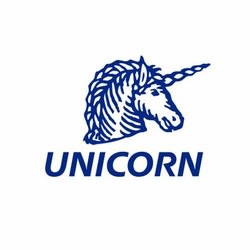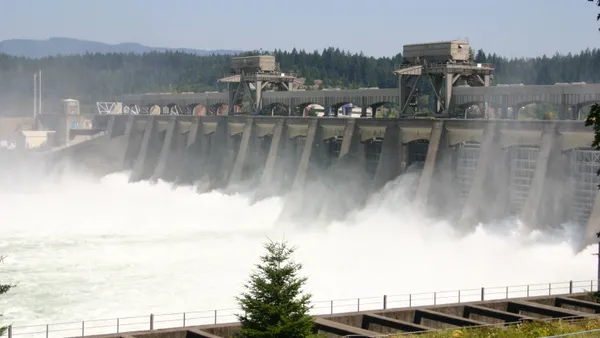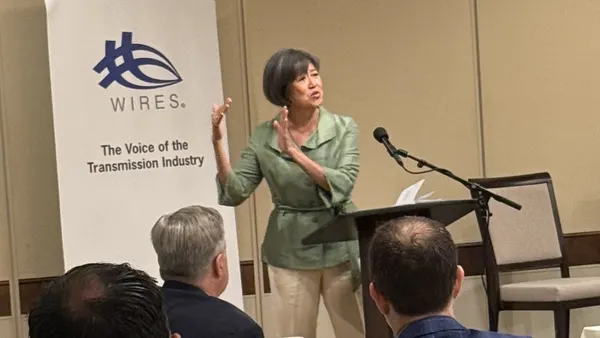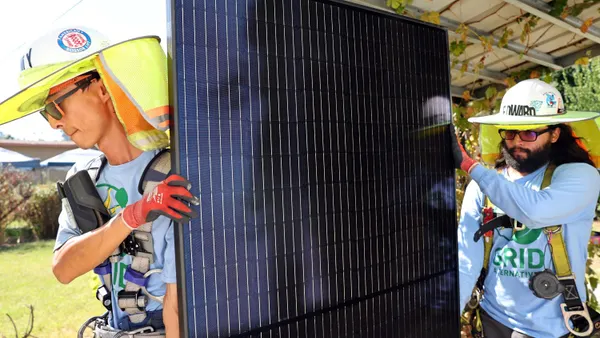Dive Brief:
-
Dynegy has agreed to buy out Energy Capital Partners’ (ECP) 35% stake in a joint venture formed to purchase ENGIE’s 9,058-MW portfolio of fossil plants in the U.S.
-
Dynegy plans to exercise the buyout option by paying ECP $375 million for its stake in Atlas Power, a discount to the original buyout floor price of $974 million.
-
The buyout does not affect ECP’s commitment to buy $150 million of Dynegy common stock at the close of the ENGIE transaction, which will make ECP Dynegy’s largest shareholder.
Dive Insight:
Public-private partnerships have taken on a new meaning in the merchant power sector recently. In two proposed transactions, publicly traded companies have teamed up with private equity players to buy merchant generation assets. They have both taken unexpected turns.
Riverstone recently said it plans to buy the 35% of Talen Energy it does not own for $14 a share, which will turn Talen into a private company. Talen went public in an IPO at $20 a share in June 2015. Talen owns about 16,000 MW of capacity in eight states.
Yesterday, Dynegy said it plans to buy ECP’s 35% stake in the Atlas joint venture the companies formed in February.
The deal is in keeping with the spirit of the original deal, but it allows ECP to cash out, albeit at a discount to the original deal terms, earlier rather than later.
When the joint venture was formed, ECP granted Dynegy the ability to buy its stake under a methodology that valued the deal at $934 million, including ECP’s initial capital contribution.
For Dynegy, the buyout reduces the acquisition cost by $184 million. It also simplifies the transaction and the organization structure, which Dynegy says will lead to greater synergies and a “substantially” higher free cash flow from the acquired assets.
“Dynegy’s intent has consistently been to fully own the ENGIE U.S. fossil portfolio,” Robert Flexon, president and CEO of Dynegy, said in a statement. “This transaction accelerates our company’s transformation, enabling us to increase our presence further in the most desirable markets with high quality assets.”
As a result of the deal with ECP, Dynegy says it will finance the ENGIE acquisition at the Dynegy Inc. level instead of pursuing portfolio-level financing as previously planned with an expected benefit of reducing annual cash interest costs by approximately $40 million.
By eliminating the structural and financial complexity of the joint venture, not only does Dynegy expect to reduce the cost of capital associated with the transaction, it expects to increase potential synergies and to be able to more efficiently use its net operating losses, which could lead to “meaningful” increases in free cash flow.
Post-closing, the combined company will have approximately 34,700 MW of generation assets with a presence in all major competitive markets in the U.S.
The ENGIE assets are in the Electric Reliability Council of Texas region, the PJM Interconnection, and in ISO-New England. The partnership with ECP had expanded Dynegy's reach into regulated markets. After the completion of the deal, 43% of Dynegy's capacity would be in the PJM market, 15% in New England, 18% in the Midwest, and 13% in ERCOT.
With the addition of ENGIE’s portfolio and the previously announced shutdown of various coal units, Dynegy says its portfolio will be 71% fueled by natural gas and 29% fueled by coal by year-end 2017.
The transaction is scheduled to close Oct. 1.












